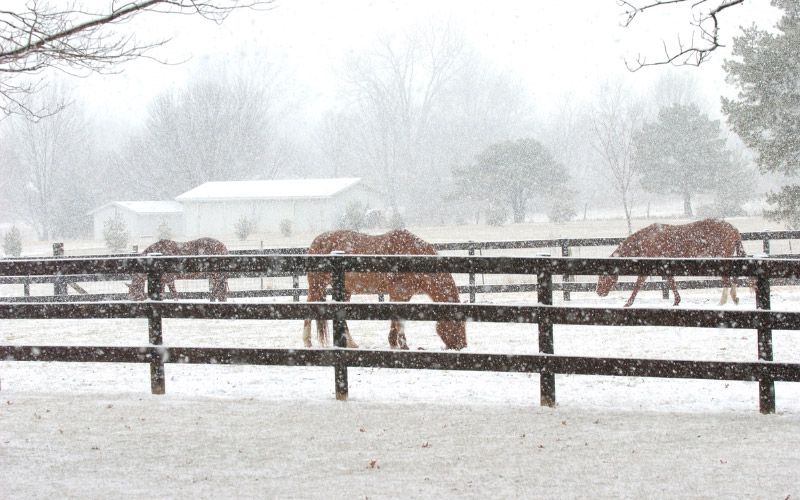
Is Your Horse Getting Enough Water in the Winter?
At Full Circle Equine, our team is dedicated to ensuring the health and well-being of horses. We understand horses are more prone to dehydration during winter as they drink less water when the temperatures drop. This can lead to serious health risks such as colic, impaction, and urinary stones. Knowing how to tell if your horse is dehydrated is crucial, especially when temperatures drop. As passionate horse enthusiasts, we aim to educate horse owners about the importance of adequate water intake during winter to keep their horses healthy and happy.
During the warmer seasons, horses have access to pastures that provide forage containing 60-80% moisture. This helps them meet their daily water requirements. Remembering to give them plenty of water in the heat is also easier. However, in winter, feed such as grain or hay contains less than 15% moisture, which is not enough to fulfill their daily water requirements.
During winter, mature horses consume between 10 and 15 gallons of water daily, although the amount may vary depending on the horse’s size and age.
How to Tell If Your Horse is Dehydrated
As a horse owner, ensuring your horse is adequately hydrated is vital. You can perform simple checks to determine if your horse is dehydrated. One of these checks is the capillary refill time (CRT). To perform this check, press your finger against your horse’s gums and observe how long it takes for the tissue to go from pale white to the usual pink. A healthy horse should have moist gums and a CRT of less than two seconds.
Another check you can do is to gently pull their skin away from their body and observe how quickly it snaps back into place. The skin should snap back immediately. If you notice that your horse’s CRT is longer than two seconds or their skin is slow to snap back, it may indicate dehydration.
Tips to Ensure Your Horse Stays Hydrated Through Winter
Here are some tips to help keep your horse hydrated through the winter:
- Water Temperature Matters: Horses may hesitate to drink icy water, so it is best to offer them slightly warmer water, around 45-65 degrees. This will encourage them to drink more.
- Regular Monitoring: Check water buckets and troughs regularly, ensuring they are clean of debris and ice; a horse will not break the ice to drink the water below, so you must ensure ice does not build up on their water source. Also, perform the tests mentioned above daily.
- Salt Intake: Provide access to a salt block. Salt encourages horses to drink more water, and ensuring adequate salt intake is crucial for maintaining electrolyte balance.
- Electrolyte Supplements: Consider supplementing your horse’s diet with electrolytes. These can help replenish vital minerals lost through increased urine production, promoting proper hydration.
- Strategic Feeding: Focus on feeding high-quality forage. Forage contains a significant amount of water. Soaked hay or hay cubes are also good options.
While winter brings its challenges for horse owners, ensuring your horse stays adequately hydrated is crucial for their overall health. If they remain in a state of dehydration, they could run the risk of impaction colic. Colic is the #1 killer of horses, and increasing their water intake is the best way to decrease the risk. A horse not drinking enough water can experience impaction colic. By paying attention to your horse’s water intake, you are increasing their overall well-being.
If you have a horse not consuming enough water, there may be an underlying issue, and you should contact us immediately. Our knowledgeable equine veterinarians can diagnose and treat a horse not drinking enough water, ensuring the horse does not become dehydrated. Additionally, if you believe your horse is already dehydrated, contact our practice immediately to schedule an emergency visit, call (662) 895-7943.